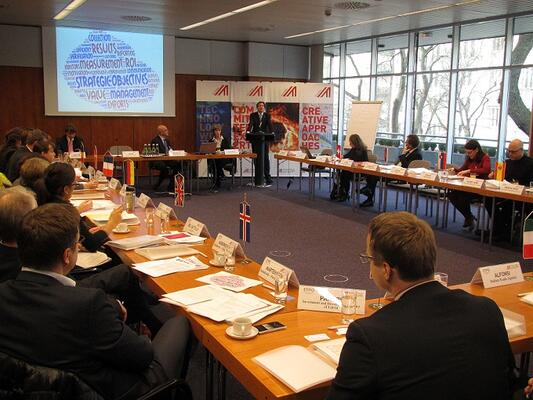
Strengthening trade promotion organizations by measuring their impact
Assessing the impact of trade promotion organizations (TPOs) is crucial to determine their effectiveness in delivering trade support services to small and medium-sized enterprises and to ensure continuous improvement, according to participants at a seminar in Vienna on 16 and 17 January. The seminar was jointly organized by the International Trade Centre (ITC) and ADVANTAGE AUSTRIA, which provides intelligence and business development services for both Austrian companies and their international business partners.
More than 20 members of the European Trade Promotion Organisations (ETPO) attended the event, which focused on the challenges of measuring results, particularly at the outcome and impact levels. The seminar rose out of the ETPO Conference in September 2013, where members expressed interest in a workshop on the impact and results of their activities. Measuring performance and communicating the results is increasingly important to TPOs, not only to satisfy funding sources and increasing demands of clients but also to help improve the effectiveness, efficiency and relevance of the services they offer.
‘We should be able to demonstrate results and manage as if we were for-profit organizations,’ said Walter Koren, Director General of ADVANTAGE AUSTRIA.
The objectives of the workshop were to share best practices on how to measure TPO results depending on the size, scope and specific mandate of the institution.
Some of the topics discussed were how to increase understanding of the value of measuring results, which results need to be measured, how results can be measured and how to improve the system of measurement. European TPOs shared their practices and approaches to measuring results, as well as ideas to improve the way results are used to manage and improve organizational performance.
‘TPOs recognize the importance of performance and impact assessment and their need for continuous improvement and collaboration with ITC in that area,’ said José Prunello, Chief of Trade Support Institution Strengthening at ITC.
‘Moreover, they expressed their interest in continuous support from ITC in preparing a study of TPO return on investment or impact.’
Measuring results and the impact of TPO involvement can help to demonstrate the value of an organization, particularly to stakeholders, and to reveal what is working and what is not. It also enables TPOs to allocate resources according to the effectiveness of activities. Participants at the seminar heard that measuring results can be used to educate and engage, promote understanding, build confidence and demonstrate delivery and value for money. Assessment also shows how results have changed over time and if activities and outputs are leading to the expected outcomes and impact. It can help TPOs to analyse trends and identify opportunities for improvement and problem solving.
Participants at the seminar discussed the importance of having a common understanding of the concepts and terminology used for impact assessment and measurement. They agreed that planning and understanding are essential in measuring results and that impact assessment models need to be targeted to the specific mandate and role of an organization, taking into account the business and economic environment.
‘Engagement of senior management in the early stage of evaluation studies is crucial to ensuring key policy issues are covered by the evaluation and to gaining acceptance of the findings,’ said Heather Booth di Giovanni, Director of Economics and Evaluation at UK Trade & Investment, a TPO that is active in about 100 countries.
Some of the areas that can be measured include export promotion, inward investment promotion and company development for the home market. The level of support for entrepreneurs and new start-ups, job creation, research and development, and innovation are all areas that are important to assess.
Conducting impact assessments also enables organizations to examine what resources are needed, such as data, technology, personnel, money and skills, the time that is needed to design, train and implement measuring results, and the support needed from project leaders and staff.
The seminar examined how to collect data for impact assessment and stressed the importance of using data sources that are already available before introducing new systems, and identifying who will pay for the assessment. Client surveys, project reports, interviews, focus groups and budgets are all considered to be valuable sources of information as well as official trade statistics, customs data and information from chambers of commerce and trade associations.
Participants heard that customer relationship management (CRM) systems are an ideal starting point to set up impact assessment processes, as they allow the collection, monitoring and analysis of results. The seminar attendees heard that CRM systems should be tailor-made to fit organizational objectives and that staff who are using the systems need to be properly trained to use them.
ITC was asked to continue working with ETPO members and to coordinate a European-wide study on the short, medium and long-term effects and impact of TPOs, paying particular attention to the effect of TPO expenditure on business results in Europe.



